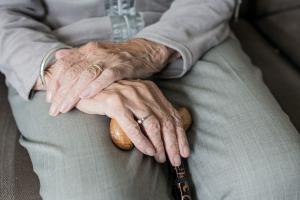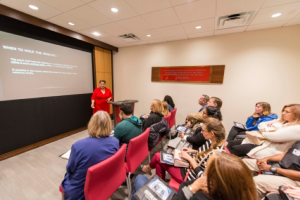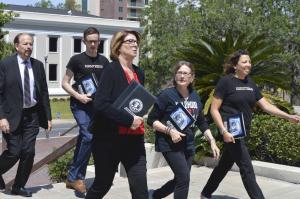New York Times Exposes Phony Diagnosis and Dangerous Drugging of the Elderly

The Florida Supreme Court published a summary on the use of involuntary and examination, called a Baker Act, which revealed that, “the involuntary placement process is also vulnerable to abuse, and that abuse is often linked to financial.

Tampa Bay area attorney and former Assistant Public Defender of the Thirteenth Judicial Circuit, Carmen Miller, Esq., is the featured speaker at the seminar on mental health rights.
A recent investigative report revealed an alarming number of senior citizens on antipsychotic drugs and fraudulent diagnosis of mental illness.
According to the article, “at least 21 percent of nursing home residents are on antipsychotic drugs” and “one in nine residents has received a schizophrenia diagnosis. In the general population, the disorder, which has strong genetic roots, afflicts roughly one in 150 people.” The article goes on to report that a pattern of questionable diagnoses were found across the county and that “the government and the industry are obscuring the true rate of antipsychotic drug use on vulnerable residents.” [1]
In Florida, there were 15,457 involuntary psychiatric examinations initiated during 2018/2019, called a Baker Act, on individuals 65 years and older which was an increase of almost 63% from 2008/2009 while the population increase was only 29%. While the report does not reveal if these seniors were taken into custody from nursing homes or assisted living facilities, it does note that “over three quarters (76.86%) of involuntary examinations of older adults (65+) were received at private receiving facilities. [2]
Elder abuse within the mental health industry is not a new problem. In the 1990’s the Florida Supreme Court published a summary on the use of the Baker Act, which revealed that, “the involuntary placement process is also vulnerable to abuse, and that abuse is often linked to financial gain or convenience of nursing homes, assisted living facilities, mental health facilities, or mental health professionals.” [3]
This Executive Summary went on to report that, “problems exist as well in regard to voluntary admissions. In 1996, the Florida Legislature amended the Baker Act to strengthen patient rights. Despite these enhanced protections, the Subcommittee learned that because in-patient treatment is extremely profitable mental health facilities and professionals sometimes abuse the voluntary admission process. Moreover, some patients deemed to be ‘voluntary’ may in reality lack the capacity to consent.” [4]
The Florida chapter of the Citizens Commission on Human Rights, CCHR, fears that while the Times story only highlighted one facility in the state, the Hialeah Shores Nursing and Rehabilitation Center in Miami, that the spurious drugging of seniors may be occurring in other nursing homes and is demanding that an investigation be conducted.
A nonprofit watchdog organization, CCHR, has been at the forefront of mental health human rights for decades working with other groups to creatte positive legislative changes. CCHR also operates a hotline for people who feel they or a loved one have suffered abuse and regularly delivers free workshops on the mental health law for families, mental health professionals and attorneys.
“We have received hundreds of calls involving forced medication, polypharmacy, untreated medical conditions that were instead being diagnosed as mental disorders and even deaths,” stated the president for CCHR in Florida, Diane Stein. “Our lawmakers know that we have a problem in our state and it is time for effective action to be taken to protect our senior citizens.”
About CCHR: Initially established by the Church of Scientology and renowned psychiatrist Dr. Thomas Szasz in 1969, CCHR’s mission is to eradicate abuses committed under the guise of mental health and enact patient and consumer protections. L. Ron Hubbard, founder of Scientology, first brought psychiatric imprisonment to wide public notice: “Thousands and thousands are seized without process of law, every week, over the ‘free world’ tortured, castrated, killed. All in the name of ‘mental health,’” he wrote in March 1969. For more information on the workshop or the protection of elder rights under the mental health law please call 727-442-8820.
Sources:
[1] Phony Diagnoses Hide High Rates of Drugging at Nursing Homes https://www.nytimes.com/2021/09/11/health/nursing-homes-schizophrenia-antipsychotics.html
[2] Baker Act Reporting Center https://www.usf.edu/cbcs/baker-act/documents/ba_usf_annual_report_2018_2019.pdf
[2] Florida Supreme Court Baker Act Summary https://www.floridasupremecourt.org/content/download/242846/file/BakerSummary.pdf
[3] Ibid.
[4] Ibid.
[5] Phony Diagnoses Hide High Rates of Drugging at Nursing Homes https://www.nytimes.com/2021/09/11/health/nursing-homes-schizophrenia-antipsychotics.html
Diane Stein
Citizens Commission on Human Rights of Florida
+1 727-422-8820
email us here
Visit us on social media:
Facebook
Twitter
LinkedIn
Legal Disclaimer:
EIN Presswire provides this news content "as is" without warranty of any kind. We do not accept any responsibility or liability for the accuracy, content, images, videos, licenses, completeness, legality, or reliability of the information contained in this article. If you have any complaints or copyright issues related to this article, kindly contact the author above.



